2022年人教版中考英语二轮复习话题三 个人兴趣、文娱与体育课件(80张)
文档属性
| 名称 | 2022年人教版中考英语二轮复习话题三 个人兴趣、文娱与体育课件(80张) |  | |
| 格式 | pptx | ||
| 文件大小 | 360.4KB | ||
| 资源类型 | 教案 | ||
| 版本资源 | 人教新目标(Go for it)版 | ||
| 科目 | 英语 | ||
| 更新时间 | 2022-05-24 12:07:41 | ||
图片预览

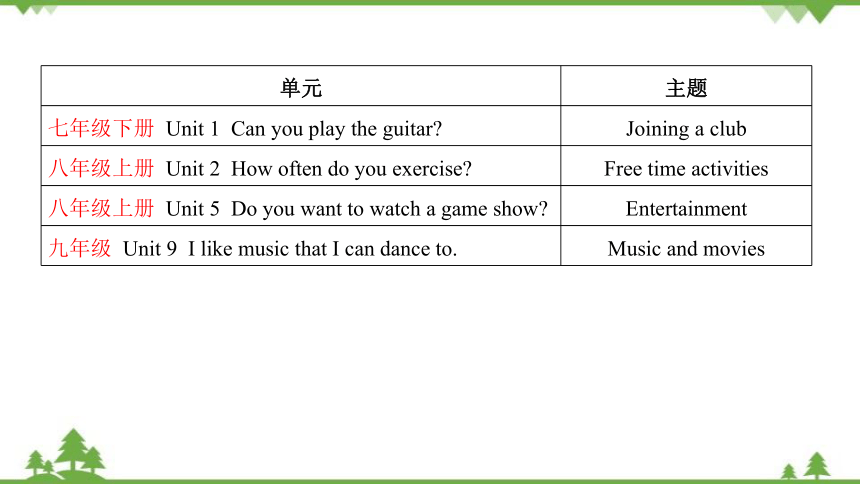
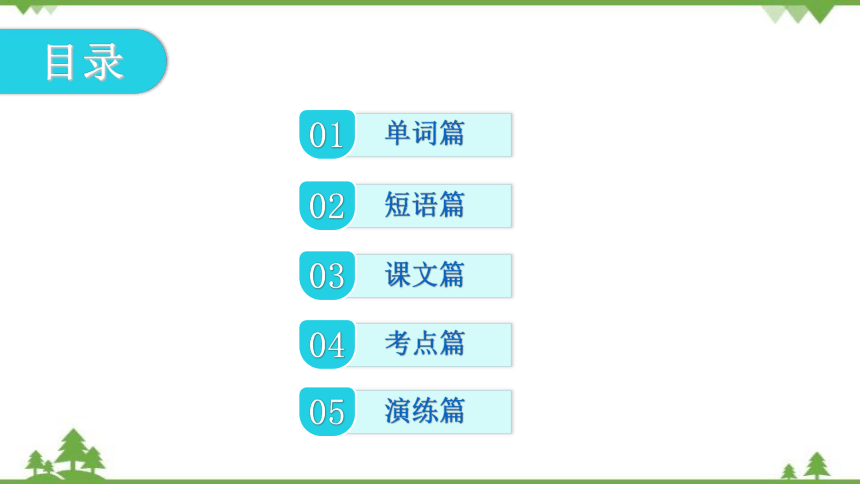
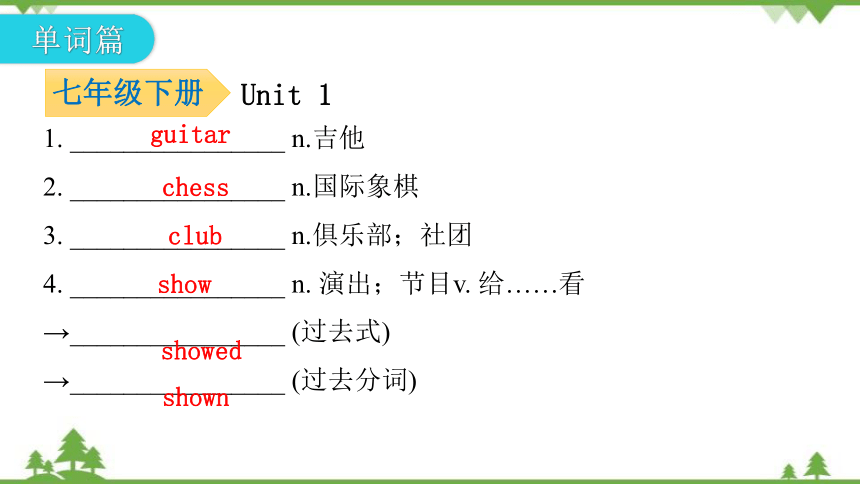
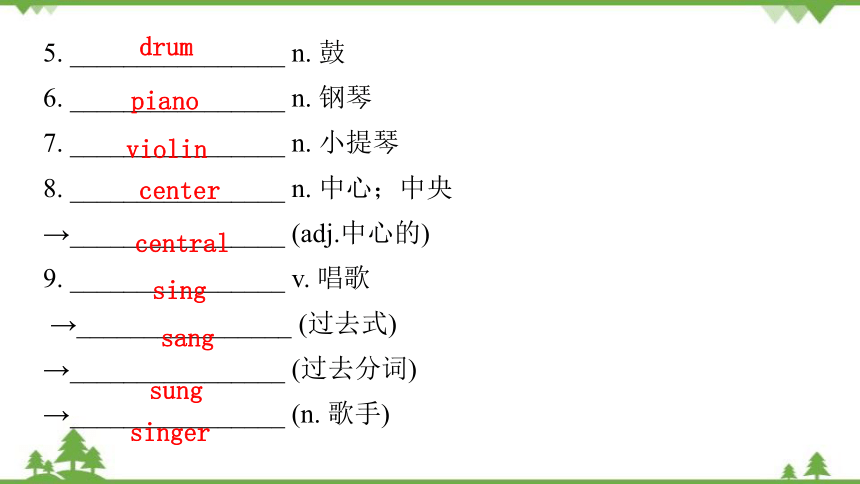
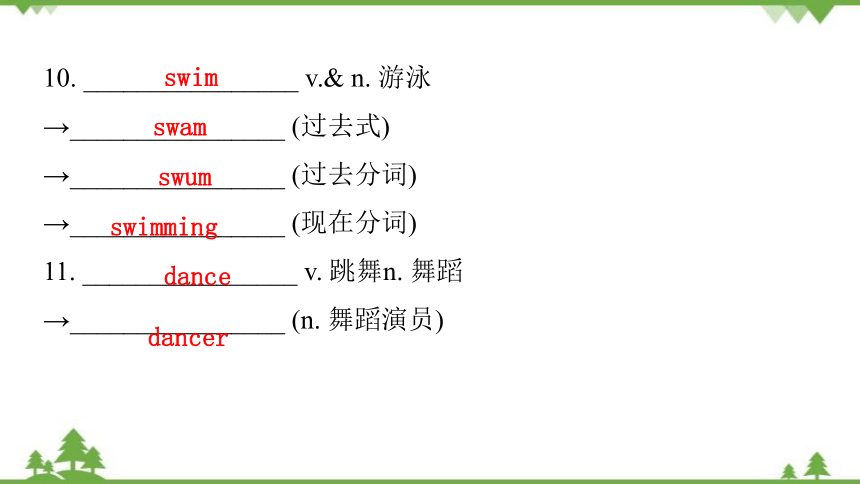
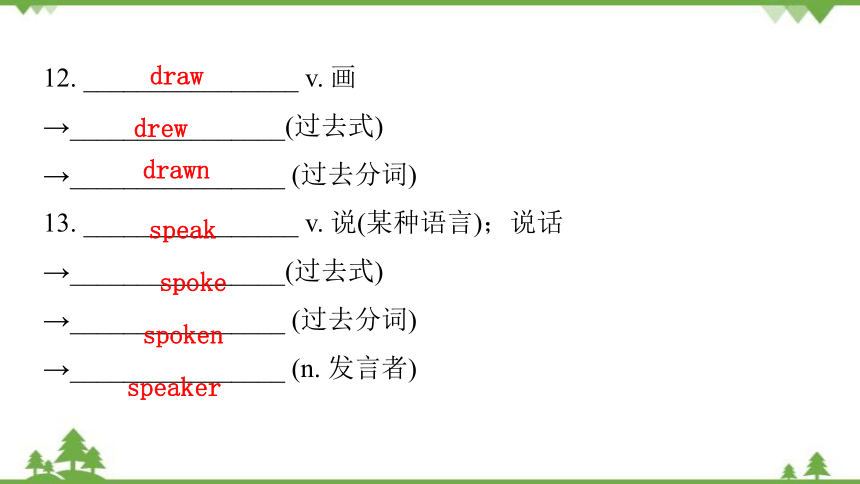
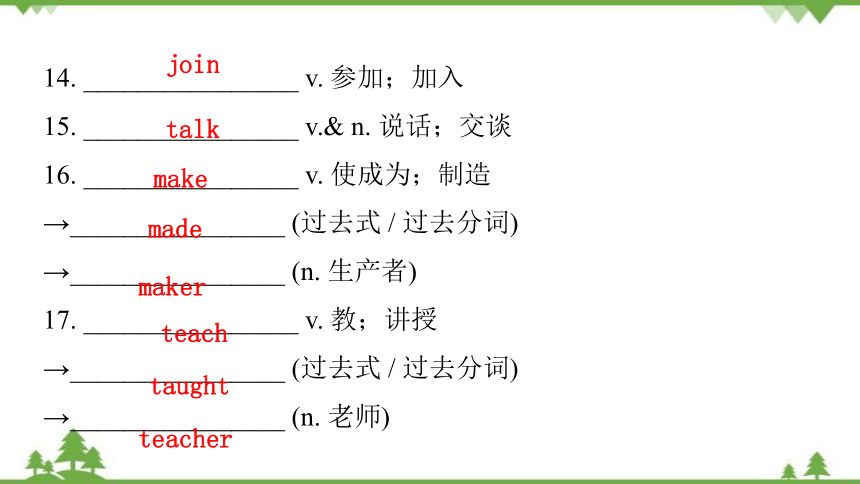
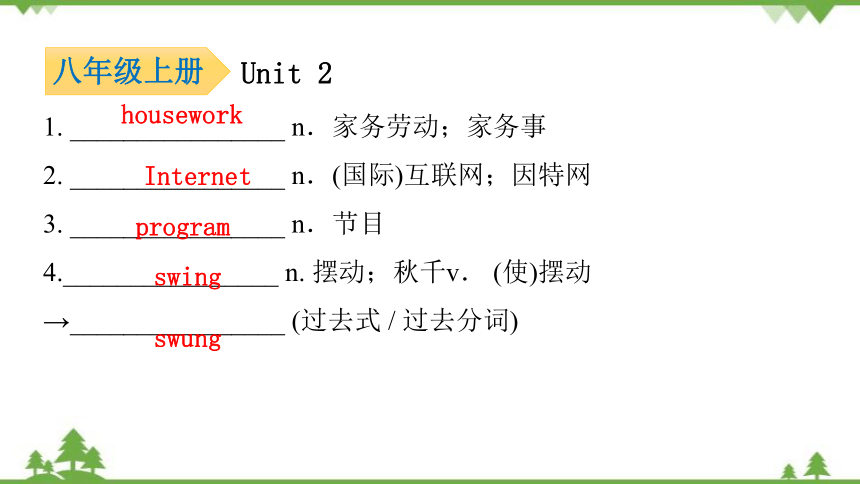
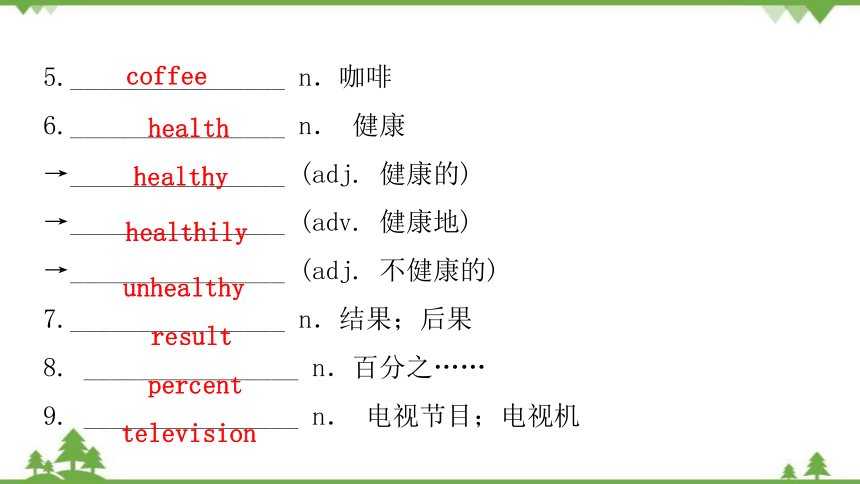
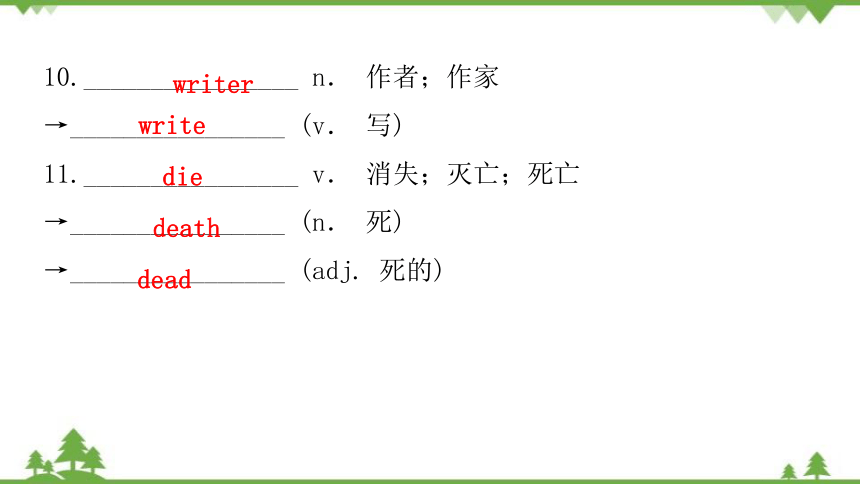
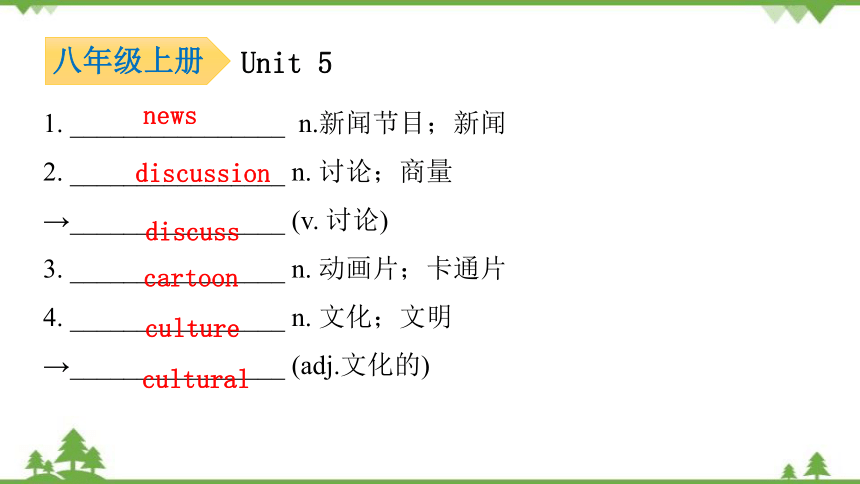
文档简介
(共80张PPT)
教材梳理(RJ)
话题三 个人兴趣、文娱与体育
单元 主题
七年级下册 Unit 1 Can you play the guitar Joining a club
八年级上册 Unit 2 How often do you exercise Free time activities
八年级上册 Unit 5 Do you want to watch a game show Entertainment
九年级 Unit 9 I like music that I can dance to. Music and movies
目录
01
单词篇
02
短语篇
03
课文篇
04
考点篇
05
演练篇
单词篇
七年级下册
Unit 1
1. ________________ n.吉他
2. ________________ n.国际象棋
3. ________________ n.俱乐部;社团
4. ________________ n. 演出;节目v. 给……看
→________________ (过去式)
→________________ (过去分词)
guitar
chess
club
show
showed
shown
5. ________________ n. 鼓
6. ________________ n. 钢琴
7. ________________ n. 小提琴
8. ________________ n. 中心;中央
→________________ (adj.中心的)
9. ________________ v. 唱歌
→________________ (过去式)
→________________ (过去分词)
→________________ (n. 歌手)
drum
piano
violin
center
central
sing
sang
sung
singer
10. ________________ v.& n. 游泳
→________________ (过去式)
→________________ (过去分词)
→________________ (现在分词)
11. ________________ v. 跳舞n. 舞蹈
→________________ (n. 舞蹈演员)
swim
swam
swum
swimming
dance
dancer
12. ________________ v. 画
→________________(过去式)
→________________ (过去分词)
13. ________________ v. 说(某种语言);说话
→________________(过去式)
→________________ (过去分词)
→________________ (n. 发言者)
draw
drew
drawn
speak
spoke
spoken
speaker
14. ________________ v. 参加;加入
15. ________________ v.& n. 说话;交谈
16. ________________ v. 使成为;制造
→________________ (过去式 / 过去分词)
→________________ (n. 生产者)
17. ________________ v. 教;讲授
→________________ (过去式 / 过去分词)
→________________ (n. 老师)
join
talk
make
made
maker
teach
taught
teacher
1. ________________ n.家务劳动;家务事
2. ________________ n.(国际)互联网;因特网
3. ________________ n.节目
4.________________ n. 摆动;秋千v. (使)摆动
→________________ (过去式 / 过去分词)
八年级上册
Unit 2
housework
Internet
program
swing
swung
5.________________ n.咖啡
6.________________ n. 健康
→________________ (adj. 健康的)
→________________ (adv. 健康地)
→________________ (adj. 不健康的)
7.________________ n.结果;后果
8. ________________ n.百分之……
9. ________________ n. 电视节目;电视机
coffee
health
healthy
healthily
unhealthy
result
percent
television
10.________________ n. 作者;作家
→________________ (v. 写)
11.________________ v. 消失;灭亡;死亡
→________________ (n. 死)
→________________ (adj. 死的)
writer
write
die
death
dead
1. ________________ n.新闻节目;新闻
2. ________________ n. 讨论;商量
→________________ (v. 讨论)
3. ________________ n. 动画片;卡通片
4. ________________ n. 文化;文明
→________________ (adj.文化的)
八年级上册
Unit 5
news
discussion
discuss
cartoon
culture
cultural
5. ________________ v. 忍受;站立
→________________ (过去式 / 过去分词)
6. ________________ v. 出现
→________________ (n. 出现)
→________________ (v. 消失)
7. ________________ v. 开始变得;变成
→________________ (过去式)
→________________ (过去分词)
stand
stood
appear
appearance
disappear
become
became
become
8. ________________ v. 失去;丢失
→________________ (过去式 / 过去分词)
9. ________________ adj. 毫无意义的
→________________ (adj. 有意义的)
→________________ (n. 意思)
10. ________________ adj. 普通的;常见的
lose
lost
meaningless
meaningful
meaning
common
11. ________________ adj. 愿意的;准备好的
12. ________________ adj. 简单的;易做的
→________________ (adv. 仅仅)
ready
simple
simply
1. ________________ n.导演;部门负责人
2. ________________ n. 悲伤;悲痛
→________________ (adj. 悲伤的)
3. ________________ n.痛苦;疼痛;苦恼
→________________ (adj. 令人痛苦的)
4. ________________ n.遗憾;怜悯v. 同情;怜悯
九年级
Unit 9
director
sadness
sad
pain
painful
pity
5. ________________ n. 总数;合计adj. 总的;全体的
→________________ (adv. 完全地)
6. ________________ n. 伤;伤口v.伤害
→________________ (adj.受伤的)
7. ________________ v. 更喜欢
8. ________________ v. 推断;料想
total
totally
wound
wounded
prefer
suppose
9. ________________ v. 粘贴;将……刺入
→________________ (过去式 / 过去分词)
10. ________________ v.感觉到;意识到n. 感觉;意识
11. ________________ v. 关闭;关上
→________________ (过去式 / 过去分词)
→________________ (现在分词)
stick
stuck
sense
shut
shut
shutting
12. ________________ v. 反映;映出
→________________ (n.反映)
13. ________________ v.& n. 表扬;赞扬
14. ________________ adj. 澳大利亚(人)的
n.澳大利亚人
→________________ (n. 澳大利亚)
reflect
reflection
praise
Australian
Australia
15. ________________ adj. 悦耳的;平滑的
→________________ (adv.平稳地)
16. __________________ adj. 空闲的;不用的v. 抽出;留出
smooth
smoothly
spare
短语篇
七年级下册
Unit 1
1.下国际象棋 _______________________
2.说英语 _______________________
3.结交朋友 _______________________
4.(在)周末 _______________________
5.跟……说 _______________________
6.善于应付……的 _______________________
7.在某方面帮助(某人) _______________________
play chess
speak English
make friends
on the weekend
talk to …
be good with …
help (sb.) with sth.
八年级上册
Unit 2
1.一周 / 月一次 _________________________
2.至少;不少于;起码 ________________
3.去购物 _________________________
4.去看电影 _________________________
5.上网 _________________________
6.去野营 _________________________
once a week / month
at least
go shopping
go to the movies
go online
go camping
7.使用互联网 ________________________
8.上钢琴课 ________________________
9.做运动 ________________________
10.垃圾食品 ________________________
11.摇摆舞 ________________________
12.问题的答案 ________________________
13.例如;像……这样 ________________________
use the Internet
have piano lessons
play sports
junk food
swing dance
the answer to the question
such as
八年级上册
Unit 5
1.肥皂剧 ________________
2.才艺秀 ________________
3.脱口秀 ________________
4.查明;弄清 ________________
5.就……进行讨论 __________________________
6.动作影片 ________________
soap opera
talent show
talk show
find out
have a discussion about …
action movie
7.出现;开花;出版 ________________
8.主要原因之一 ___________________________
9.尽力 ________________
10.装扮;乔装打扮 ________________
11.代替;替换 ___________________
12.干得好 ________________
13.准备好(做某事);愿意(做某事) ________________
come out
one of the main reasons
try one’s best
dress up
take sb.’s place
do a good job
be ready to
九年级
Unit 9
1.随着音乐跳舞 ________________
2.随着音乐唱歌 _________________________
3.电子音乐 ________________________
4.既然那样;假使那样的话 ________________
5.坚持;固守 ________________
6.使某人高兴起来 ________________
dance to music
sing along with music
electronic music
in that case
stick to
cheer sb. up
7.动作片 ___________________________
8.偶尔地;间或 ___________________________
9.总共;合计 ___________________________
10.中国民乐 ___________________________
11.结婚 __________________________
action movie
once in a while
in total
Chinese folk music
get married
七年级下册
Unit 1
1.你很擅长讲故事。 ___________________________________
2.——简和吉尔会游泳吗 ___________________________
——是的,她们会。 / 不,她们不会。
________________________________________
课文篇
You are very good at telling stories.
—Can Jane and Jill swim
—Yes, they can. / No, they can’t.
3.——你想要加入什么俱乐部
______________________________________
——我想要加入国际象棋俱乐部。
______________________________________
—What club do you want to join
—I want to join the chess club.
八年级上册
Unit 2
1.旧习难改。 ___________________________
2.我们认为最佳的放松方式是通过锻炼。 _________________________________________________
3.对我们提出的有关看电视的问题的回答也颇有意思。
_____________________________ about watching television were also interesting.
Old habits die hard.
We think the best way to relax is through exercise.
The answers to our questions
4.通过使用互联网或观看游戏类节目来放松是件好事。
________________________ using the Internet or watching game shows.
It is good to relax by
八年级上册
Unit 5
1.——你认为访谈节目怎么样
_____________________________________________
——我不介意它们。 ___________________________
2.主要的原因之一是米奇就像一个普通人。
__________________________ is that Mickey was like _______________________________.
—What do you think of talk shows
—I don’t mind them.
One of the main reasons
a common man
九年级
Unit 9
1.——你喜欢哪种电影
____________________________________________
——我更喜欢能让我思考一些事情的电影。 _____________________________________________________
—What kind of movies do you like
—I prefer movies that / which give me something to think about.
2.——卡门喜欢哪种音乐家
___________________________________________________
——她喜欢演奏不同类型乐曲的音乐家。
___________________________________________________
—What kind of musicians does Carmen like
—She likes musicians who play different kinds of music.
3.那首用二胡演奏的乐曲尤其使我感动。 _____________________________________________________
The piece which was played on the erhu especially moved me.
4.遗憾的是,一共只有六首曲子被录了下来得以传世,但时至今日,他(阿炳)依旧颇受欢迎。
________________________ only six pieces of music in total __________________ for the future world to hear, but his popularity continues to this day.
It is a pity that
were recorded
考点1
can表示能力的用法【七年级下册 Unit 1】
专练
( )1.—_______ Tom ______ English songs —Yes, he can.
A.Is; sing B.Does; sing C.Can; sings D.Can; sing
( )2.—Can I sit here —No, _________.
A.I can’t B.I don’t C.you can’t D.you don’t
考点篇
D
C
( )3.My sister can’t _________ a kite.
A.made B.makes C.make D.to make
( )4.—Can you paint —_________.
A.Yes,a little B.Yes,little C.No,a little D.No,little
( )5.—_________ can you do —I can play the violin.
A.What B.Why C.How D.When
点拨 can的过去式为could。can与be able to的意义基本相同,都可用来表示能力。
C
A
A
考点2
show的用法【七年级下册 Unit 1】
专练
1.根据汉语意思完成句子,词数不限
(1)我们可以去那儿看一场演出。
We can go there and ________________.
(2)你能给我展示一下你的飞机模型吗
Can you ______________________________________________
______________________
see a show
show your model plane(s) to me / show me your model plane(s)
( )2.—What’s next —I’ll make Tony _________ you around.
A.to show B.show C.shows D.showing
点拨 show作动词,意为“给……看;展示”,“show sb.sth.=show sth.to sb.”。作名词,意为“演出;节目”。
B
考点3
say,tell,talk和speak的区别【七年级下册 Unit 1】
专练 根据句意,用talk, say, speak或tell填空
1. Can you ________________ Chinese
2. I can ________________ you something about her.
3. Please ________________ hello to your teacher.
4. They like to ________________ about music after class.
speak
tell
say
talk
点拨
比较项 含义及用法 搭配
speak 意为“说(某种语言);说话”,强调说话的动作或说(某种语言) speak to / with … 与……说话
speak English 说英语
tell 意为“讲述;告诉”,强调讲给别人听 tell a story / lie 讲故事 / 说谎
tell sb. sth.=tell sth. to sb. 告诉某人某事
tell sb.(not) to do sth. 告诉某人(不要)做某事
续表
比较项 含义及用法 搭配
talk 意为“说话;交谈”,强调与人交谈 talk to / with sb. 与某人交谈 (to 强调主语说,宾语听;with 强调双方交流)
talk about 谈论
say 意为“说;讲”,强调说话的内容 say sorry to sb. 向某人道歉
考点4
频度副词【八年级上册 Unit 2】
专练
( )1.—How often does Mike go to the computer room
—_________. He is so busy with his study.
A.Almost every day B.Always C.Hardly ever D.Sometimes
( )2.—How many hours do you exercise every day
—_________.
A.Twice a day B.Second C.Two D.Two times
C
C
( )3.If my friends have any problems, my door is _________ open to them.
A.never B.seldom C.sometimes D.always
( )4.He _________late for school.
A.is sometimes B.are sometimes
C.sometimes are D.sometimes is
D
A
点拨 频度副词通常放在be动词、情态动词和助动词之后,行为动词之前,表示做某事的频率。(详解见主书第一部分[第六节 形容词和副词])
考点5
die的用法【八年级上册 Unit 2】
专练
1.他叔叔十年前去世的。(根据汉语意思完成句子,每空一词)
His uncle ________________ 10 years ________________.
( )2.Premier Zhou Enlai _________ for many years, but he still lives in the hearts of Chinese people.
A.died B.was died C.has been died D.has been dead
died
ago
D
点拨
词语 词性 含义 用法
die v. 消失;灭亡;死亡 表示“死亡”的动作,不能和表示一段时间的状语连用
death n. 死;死亡 —
dead adj. 死的;失去生命的 常和be动词连用(be dead),表示死的状态
dying adj. 临死的;临终的 是die的现在分词,不过常用作形容词
考点6
across, through和past的区别【八年级上册 Unit 2】
专练 根据句意,用across, through或past填空
1.Go ________________ the bridge and turn left.
2.The group walked ________________ the forests.
3.Lin Tao walked ____________ the hall and went into the library.
4.The man swam ________________ the Yangtze River last year.
5.She waved as she drove ________________.
across
through
through
across
past
点拨
比较项 相同点 不同点
across 都可作介词,都可以表示“穿过” 意为“横过”,强调从物体表面的一边到另一边
through 意为“穿过;贯穿”,强调从物体内部或空间穿过
past 意为“在另一边”,强调从旁边经过,走过
考点7
动词不定式作宾语的用法【八年级上册 Unit 5】
专练
( )1.—Please stay with me this weekend.
—I’m sorry, but my father and I planned _________ Beijing a long time ago.
A.visit B.visiting C.to visit D.visited
C
( )2.—Daniel, do you know that bees never get lost
—Yes.Bees always remember _____ the same way as they went.
A.come back B.came back
C.coming back D.to come back
( )3.—Would you like _________ a film with us tonight
—Sorry, I have to help my mother do housework.
A.see B.to see C.seeing D.saw
D
B
点拨 巧记用不定式作宾语的动词:
想要,忘记,拒绝(want, forget, refuse);
需要,努力,学习(need, try, learn);
喜欢,同意,帮助(like, agree, help);
希望,决定,开始(hope / wish, decide, begin / start)。
考点8
happen和take place的区别【八年级上册 Unit 5】
专练 根据句意,用happen或take place的适当形式填空
1.A terrible car accident ________________ last night.
2.What ________________ to your brother this morning
3.The party will ________________ on Friday evening.
happened
happened
take place
点拨 happen意为“发生;出现”,多指偶然发生的事情。take place多指事先安排好的事情,用来表示 “举行”;也可指事件“发生”。两者都不能用于被动语态。
考点9
famous的用法【八年级上册 Unit 5】
专练 根据句意,用适当的介词填空
1.The town is famous ________________ its hot springs.
2.Mr.Brown is famous ________________ a researcher.
3.Mother Teresa is famous _____________ her work with the poor.
for
as
for
点拨 be famous for+原因,意为“因……而出名”; be famous as+身份或职业,意为“作为……而出名”。
考点10
定语从句【九年级 Unit 9】
( )1.The stories _________ were written by Mark Twain are often humorous.
A.who B.that C.those D.what
( )2.Books are everywhere,but it’s not easy to find one _________ is really interesting.
A.that B.who C.it D.what
B
A
( )3.Do you know the place _________ we visited last week
A.that B.whom C.when D.who
( )4.The man _________ wears glasses is my brother.
A.where B.when C.which D.who
A
D
点拨
定语从句
关系代词 指代的先行词 在从句中充当的成分 是否可省略
that 指人或指物 主语或宾语 宾语可省
which 指物 主语或宾语 宾语可省
who 指人 主语或宾语 宾语可省
whom 指人 宾语 可省
考点11
prefer的用法【九年级 Unit 9】
专练
( )1.The old man prefers to _________ at home rather than _________ to have a picnic.
A.staying; going B.stay; going
C.stay; go D.staying; go
C
( )2.I’m sleepy. I prefer _____ at home to going out for a walk.
A.sleeping B.to sleep C.slept D.sleep
( )3.—Would you like some coffee —Yes, and please get me some milk. I prefer coffee _________ milk.
A.with B.to C.on D.of
A
A
点拨
prefer v. 更喜欢 ①prefer sth. 更喜欢…… 【注意】② ③中的to为介词,④ ⑤中的to 为不定式符号
②prefer A to B 与B相比,更喜欢A
③prefer doing A to doing B 与做B相比,更喜欢做A
④prefer to do sth.宁愿 / 更喜欢做某事
⑤prefer to do A rather than do B宁愿做A,而不愿做B
演练篇
一、完形填空
My name is Michell. My mother is a German teacher, but we live in Poland. Polish is my native language. I learned English very well and now I want to share my experience with you.
When I was six, my dad _1_ me to listen to the Beatles. I listened to them every day for the _2_ seven years. In the
encouraged
next
beginning, I could understand nothing of what they were singing. But soon I started to understand more words, _3_ the ones which appeared in the titles.
Today, I can understand the Beatles very clearly. Each time I hear a Beatles’ song, I am happy and _4_ because I have made my childhood’s dream come true. I can understand the lyrics of the songs I _5_. And that gives me _6_ for many hours every day.
especially
proud
listen to
pleasure
When I was 13 years old, I started reading science fiction books. I read in Polish. Somehow I felt that in English the books would be even more _7_. I finally decided that I wanted to read books in English. I learned every new English word that I met.
Every time I learnt a new word, I _8_ that my reading ability was improving. At some point, I read my first whole _9_ in English and I understood it. That moment was a breakthrough (突破) in my life. My dad said to me, “You have broken a barrier(障碍) and _10_ a new world!”
interesting
felt
book
got into
( )1. A. encouraged B. created
C. reviewed D. admired
( )2. A. final B. busy C. dear D. next
( )3. A. nearly B. exactly C. normally D. especially
( )4. A. fantastic B. useful C. proud D. busy
( )5. A. talk about B. look at C. listen to D. join in
A
D
D
C
C
( )6. A. pleasure B. influence C. secrets D. safety
( )7. A. private B. correct C. direct D. interesting
( )8. A. smelt B. tasted
C. sounded D. felt
( )9. A. book B. song C. words D. lyrics
( )10. A. fell into B. got into
C. divided into D. turned into
A
D
D
A
B
二、阅读理解(B篇)
Do you have the experience of taking music lessons against your wishes Perhaps you have complained (抱怨) about it because you thought it took you much playtime. But now you’d better thank your parents for their time and money spent on your musical training. A recent study suggests that music lessons can make children have better memories than their peers.
The Canadian study showed that after one year of musical training,children did better in a memory test than those who didn’t take music lessons.
The researchers divided the children aged between 4 and 6 into two groups—one group of children took music lessons outside school, and the other didn’t take any musical training. In one year,they took four tests at different times. The results showed brain development changes at least every four months.
The children taking music lessons not only did better in musical listening but also made faster progress in other ways, such as reading, writing, math and IQ.
People say music is the good medicine for a broken heart. Someone said, “Through music,a child goes into a world of beauty, learns to take care of others and makes his mind and body healthy.”
Music is an important part of our lives. Now it seems music can also help us to improve our memories. We are sure to find more and more in the wonderful world of music.
( )1.The underlined word “peers” means “_________”.
A.people who are younger than you
B.people who are older than you
C.people who are the same age as you
D.people who are richer than you
C
( )2.The children in the study took music lessons for ______.
A.four months B.six months
C.one year D.two years
C
( )3.The Canadian study tested the relationship between _____.
A.students’ writing and reading
B.music lessons in and outside schools
C.children and adults
D.music learning and brain development
D
( )4.According to the last paragraph, most people think music can make us _________.
A.happy B.worried C.confident D.proud
( )5.What does the passage mainly tell us
A.How to become cleverer by learning music.
B.How to sing a song well.
C.What to find in the wonderful world of music.
D.Music is good for us.
A
D
三、回答问题
Playing sports is good for both your body and mind, as scientific studies have proven. China has been encouraging people to exercise more. The fitness equipment(器材) that can be seen in different communities is part of these efforts.
China plans to do more. In 2019, the State Council published an outline(纲要)for developing the country’s sports industry. It aims to build the country into a “modern sports power” by 2050.
The government’s work will mainly focus on the following areas—public sports participation(参与), competitive sports performances, the sports industry, culture and international sports exchanges. According to the outline, people will have more chances to use sports equipment. By 2035,45 percent of the population is expected to exercise regularly,up from 33.9 percent in 2018.
The sports industry, including the production of sports goods and sports tourism, will become an important part of the national economy(经济) by then, making up 4 percent of China’s GDP. The outline also lists specific goals for teenagers. For example, teenagers are expected to learn at least two sports. Other goals include promoting(推广) winter sports in schools and building more outdoor sports camps for youths.
More importance will be placed on the three “big balls”—soccer, basketball and volleyball. More people will be encouraged to play them.
1.When was the outline for developing the country’s sports industry published
_____________________________________________________
It was published in 2019 / In 2019.
2.What does the outline aim to
_____________________________________________________
_____________________________________________________
3.What was the percent of population that exercised regularly in 2018
_____________________________________________________
_____________________________________________________
The outline / It aims to build the country into a “modern sports power” by 2050.
It was 33.9 percent of the population that exercised regularly in 2018. / 33.9 percent. / 33.9%.
4.Who are expected to learn at least two sports
_____________________________________________________
5.Which sports will be placed on more importance
_____________________________________________________
_____________________________________________________
_____________________________________________________
Teenagers are expected to learn at least two sports. / Teenagers.
The three “big balls”—soccer, basketball and volleyball will be placed on more importance. / The three “big balls”—soccer, basketball and volleyball.
谢 谢!
教材梳理(RJ)
话题三 个人兴趣、文娱与体育
单元 主题
七年级下册 Unit 1 Can you play the guitar Joining a club
八年级上册 Unit 2 How often do you exercise Free time activities
八年级上册 Unit 5 Do you want to watch a game show Entertainment
九年级 Unit 9 I like music that I can dance to. Music and movies
目录
01
单词篇
02
短语篇
03
课文篇
04
考点篇
05
演练篇
单词篇
七年级下册
Unit 1
1. ________________ n.吉他
2. ________________ n.国际象棋
3. ________________ n.俱乐部;社团
4. ________________ n. 演出;节目v. 给……看
→________________ (过去式)
→________________ (过去分词)
guitar
chess
club
show
showed
shown
5. ________________ n. 鼓
6. ________________ n. 钢琴
7. ________________ n. 小提琴
8. ________________ n. 中心;中央
→________________ (adj.中心的)
9. ________________ v. 唱歌
→________________ (过去式)
→________________ (过去分词)
→________________ (n. 歌手)
drum
piano
violin
center
central
sing
sang
sung
singer
10. ________________ v.& n. 游泳
→________________ (过去式)
→________________ (过去分词)
→________________ (现在分词)
11. ________________ v. 跳舞n. 舞蹈
→________________ (n. 舞蹈演员)
swim
swam
swum
swimming
dance
dancer
12. ________________ v. 画
→________________(过去式)
→________________ (过去分词)
13. ________________ v. 说(某种语言);说话
→________________(过去式)
→________________ (过去分词)
→________________ (n. 发言者)
draw
drew
drawn
speak
spoke
spoken
speaker
14. ________________ v. 参加;加入
15. ________________ v.& n. 说话;交谈
16. ________________ v. 使成为;制造
→________________ (过去式 / 过去分词)
→________________ (n. 生产者)
17. ________________ v. 教;讲授
→________________ (过去式 / 过去分词)
→________________ (n. 老师)
join
talk
make
made
maker
teach
taught
teacher
1. ________________ n.家务劳动;家务事
2. ________________ n.(国际)互联网;因特网
3. ________________ n.节目
4.________________ n. 摆动;秋千v. (使)摆动
→________________ (过去式 / 过去分词)
八年级上册
Unit 2
housework
Internet
program
swing
swung
5.________________ n.咖啡
6.________________ n. 健康
→________________ (adj. 健康的)
→________________ (adv. 健康地)
→________________ (adj. 不健康的)
7.________________ n.结果;后果
8. ________________ n.百分之……
9. ________________ n. 电视节目;电视机
coffee
health
healthy
healthily
unhealthy
result
percent
television
10.________________ n. 作者;作家
→________________ (v. 写)
11.________________ v. 消失;灭亡;死亡
→________________ (n. 死)
→________________ (adj. 死的)
writer
write
die
death
dead
1. ________________ n.新闻节目;新闻
2. ________________ n. 讨论;商量
→________________ (v. 讨论)
3. ________________ n. 动画片;卡通片
4. ________________ n. 文化;文明
→________________ (adj.文化的)
八年级上册
Unit 5
news
discussion
discuss
cartoon
culture
cultural
5. ________________ v. 忍受;站立
→________________ (过去式 / 过去分词)
6. ________________ v. 出现
→________________ (n. 出现)
→________________ (v. 消失)
7. ________________ v. 开始变得;变成
→________________ (过去式)
→________________ (过去分词)
stand
stood
appear
appearance
disappear
become
became
become
8. ________________ v. 失去;丢失
→________________ (过去式 / 过去分词)
9. ________________ adj. 毫无意义的
→________________ (adj. 有意义的)
→________________ (n. 意思)
10. ________________ adj. 普通的;常见的
lose
lost
meaningless
meaningful
meaning
common
11. ________________ adj. 愿意的;准备好的
12. ________________ adj. 简单的;易做的
→________________ (adv. 仅仅)
ready
simple
simply
1. ________________ n.导演;部门负责人
2. ________________ n. 悲伤;悲痛
→________________ (adj. 悲伤的)
3. ________________ n.痛苦;疼痛;苦恼
→________________ (adj. 令人痛苦的)
4. ________________ n.遗憾;怜悯v. 同情;怜悯
九年级
Unit 9
director
sadness
sad
pain
painful
pity
5. ________________ n. 总数;合计adj. 总的;全体的
→________________ (adv. 完全地)
6. ________________ n. 伤;伤口v.伤害
→________________ (adj.受伤的)
7. ________________ v. 更喜欢
8. ________________ v. 推断;料想
total
totally
wound
wounded
prefer
suppose
9. ________________ v. 粘贴;将……刺入
→________________ (过去式 / 过去分词)
10. ________________ v.感觉到;意识到n. 感觉;意识
11. ________________ v. 关闭;关上
→________________ (过去式 / 过去分词)
→________________ (现在分词)
stick
stuck
sense
shut
shut
shutting
12. ________________ v. 反映;映出
→________________ (n.反映)
13. ________________ v.& n. 表扬;赞扬
14. ________________ adj. 澳大利亚(人)的
n.澳大利亚人
→________________ (n. 澳大利亚)
reflect
reflection
praise
Australian
Australia
15. ________________ adj. 悦耳的;平滑的
→________________ (adv.平稳地)
16. __________________ adj. 空闲的;不用的v. 抽出;留出
smooth
smoothly
spare
短语篇
七年级下册
Unit 1
1.下国际象棋 _______________________
2.说英语 _______________________
3.结交朋友 _______________________
4.(在)周末 _______________________
5.跟……说 _______________________
6.善于应付……的 _______________________
7.在某方面帮助(某人) _______________________
play chess
speak English
make friends
on the weekend
talk to …
be good with …
help (sb.) with sth.
八年级上册
Unit 2
1.一周 / 月一次 _________________________
2.至少;不少于;起码 ________________
3.去购物 _________________________
4.去看电影 _________________________
5.上网 _________________________
6.去野营 _________________________
once a week / month
at least
go shopping
go to the movies
go online
go camping
7.使用互联网 ________________________
8.上钢琴课 ________________________
9.做运动 ________________________
10.垃圾食品 ________________________
11.摇摆舞 ________________________
12.问题的答案 ________________________
13.例如;像……这样 ________________________
use the Internet
have piano lessons
play sports
junk food
swing dance
the answer to the question
such as
八年级上册
Unit 5
1.肥皂剧 ________________
2.才艺秀 ________________
3.脱口秀 ________________
4.查明;弄清 ________________
5.就……进行讨论 __________________________
6.动作影片 ________________
soap opera
talent show
talk show
find out
have a discussion about …
action movie
7.出现;开花;出版 ________________
8.主要原因之一 ___________________________
9.尽力 ________________
10.装扮;乔装打扮 ________________
11.代替;替换 ___________________
12.干得好 ________________
13.准备好(做某事);愿意(做某事) ________________
come out
one of the main reasons
try one’s best
dress up
take sb.’s place
do a good job
be ready to
九年级
Unit 9
1.随着音乐跳舞 ________________
2.随着音乐唱歌 _________________________
3.电子音乐 ________________________
4.既然那样;假使那样的话 ________________
5.坚持;固守 ________________
6.使某人高兴起来 ________________
dance to music
sing along with music
electronic music
in that case
stick to
cheer sb. up
7.动作片 ___________________________
8.偶尔地;间或 ___________________________
9.总共;合计 ___________________________
10.中国民乐 ___________________________
11.结婚 __________________________
action movie
once in a while
in total
Chinese folk music
get married
七年级下册
Unit 1
1.你很擅长讲故事。 ___________________________________
2.——简和吉尔会游泳吗 ___________________________
——是的,她们会。 / 不,她们不会。
________________________________________
课文篇
You are very good at telling stories.
—Can Jane and Jill swim
—Yes, they can. / No, they can’t.
3.——你想要加入什么俱乐部
______________________________________
——我想要加入国际象棋俱乐部。
______________________________________
—What club do you want to join
—I want to join the chess club.
八年级上册
Unit 2
1.旧习难改。 ___________________________
2.我们认为最佳的放松方式是通过锻炼。 _________________________________________________
3.对我们提出的有关看电视的问题的回答也颇有意思。
_____________________________ about watching television were also interesting.
Old habits die hard.
We think the best way to relax is through exercise.
The answers to our questions
4.通过使用互联网或观看游戏类节目来放松是件好事。
________________________ using the Internet or watching game shows.
It is good to relax by
八年级上册
Unit 5
1.——你认为访谈节目怎么样
_____________________________________________
——我不介意它们。 ___________________________
2.主要的原因之一是米奇就像一个普通人。
__________________________ is that Mickey was like _______________________________.
—What do you think of talk shows
—I don’t mind them.
One of the main reasons
a common man
九年级
Unit 9
1.——你喜欢哪种电影
____________________________________________
——我更喜欢能让我思考一些事情的电影。 _____________________________________________________
—What kind of movies do you like
—I prefer movies that / which give me something to think about.
2.——卡门喜欢哪种音乐家
___________________________________________________
——她喜欢演奏不同类型乐曲的音乐家。
___________________________________________________
—What kind of musicians does Carmen like
—She likes musicians who play different kinds of music.
3.那首用二胡演奏的乐曲尤其使我感动。 _____________________________________________________
The piece which was played on the erhu especially moved me.
4.遗憾的是,一共只有六首曲子被录了下来得以传世,但时至今日,他(阿炳)依旧颇受欢迎。
________________________ only six pieces of music in total __________________ for the future world to hear, but his popularity continues to this day.
It is a pity that
were recorded
考点1
can表示能力的用法【七年级下册 Unit 1】
专练
( )1.—_______ Tom ______ English songs —Yes, he can.
A.Is; sing B.Does; sing C.Can; sings D.Can; sing
( )2.—Can I sit here —No, _________.
A.I can’t B.I don’t C.you can’t D.you don’t
考点篇
D
C
( )3.My sister can’t _________ a kite.
A.made B.makes C.make D.to make
( )4.—Can you paint —_________.
A.Yes,a little B.Yes,little C.No,a little D.No,little
( )5.—_________ can you do —I can play the violin.
A.What B.Why C.How D.When
点拨 can的过去式为could。can与be able to的意义基本相同,都可用来表示能力。
C
A
A
考点2
show的用法【七年级下册 Unit 1】
专练
1.根据汉语意思完成句子,词数不限
(1)我们可以去那儿看一场演出。
We can go there and ________________.
(2)你能给我展示一下你的飞机模型吗
Can you ______________________________________________
______________________
see a show
show your model plane(s) to me / show me your model plane(s)
( )2.—What’s next —I’ll make Tony _________ you around.
A.to show B.show C.shows D.showing
点拨 show作动词,意为“给……看;展示”,“show sb.sth.=show sth.to sb.”。作名词,意为“演出;节目”。
B
考点3
say,tell,talk和speak的区别【七年级下册 Unit 1】
专练 根据句意,用talk, say, speak或tell填空
1. Can you ________________ Chinese
2. I can ________________ you something about her.
3. Please ________________ hello to your teacher.
4. They like to ________________ about music after class.
speak
tell
say
talk
点拨
比较项 含义及用法 搭配
speak 意为“说(某种语言);说话”,强调说话的动作或说(某种语言) speak to / with … 与……说话
speak English 说英语
tell 意为“讲述;告诉”,强调讲给别人听 tell a story / lie 讲故事 / 说谎
tell sb. sth.=tell sth. to sb. 告诉某人某事
tell sb.(not) to do sth. 告诉某人(不要)做某事
续表
比较项 含义及用法 搭配
talk 意为“说话;交谈”,强调与人交谈 talk to / with sb. 与某人交谈 (to 强调主语说,宾语听;with 强调双方交流)
talk about 谈论
say 意为“说;讲”,强调说话的内容 say sorry to sb. 向某人道歉
考点4
频度副词【八年级上册 Unit 2】
专练
( )1.—How often does Mike go to the computer room
—_________. He is so busy with his study.
A.Almost every day B.Always C.Hardly ever D.Sometimes
( )2.—How many hours do you exercise every day
—_________.
A.Twice a day B.Second C.Two D.Two times
C
C
( )3.If my friends have any problems, my door is _________ open to them.
A.never B.seldom C.sometimes D.always
( )4.He _________late for school.
A.is sometimes B.are sometimes
C.sometimes are D.sometimes is
D
A
点拨 频度副词通常放在be动词、情态动词和助动词之后,行为动词之前,表示做某事的频率。(详解见主书第一部分[第六节 形容词和副词])
考点5
die的用法【八年级上册 Unit 2】
专练
1.他叔叔十年前去世的。(根据汉语意思完成句子,每空一词)
His uncle ________________ 10 years ________________.
( )2.Premier Zhou Enlai _________ for many years, but he still lives in the hearts of Chinese people.
A.died B.was died C.has been died D.has been dead
died
ago
D
点拨
词语 词性 含义 用法
die v. 消失;灭亡;死亡 表示“死亡”的动作,不能和表示一段时间的状语连用
death n. 死;死亡 —
dead adj. 死的;失去生命的 常和be动词连用(be dead),表示死的状态
dying adj. 临死的;临终的 是die的现在分词,不过常用作形容词
考点6
across, through和past的区别【八年级上册 Unit 2】
专练 根据句意,用across, through或past填空
1.Go ________________ the bridge and turn left.
2.The group walked ________________ the forests.
3.Lin Tao walked ____________ the hall and went into the library.
4.The man swam ________________ the Yangtze River last year.
5.She waved as she drove ________________.
across
through
through
across
past
点拨
比较项 相同点 不同点
across 都可作介词,都可以表示“穿过” 意为“横过”,强调从物体表面的一边到另一边
through 意为“穿过;贯穿”,强调从物体内部或空间穿过
past 意为“在另一边”,强调从旁边经过,走过
考点7
动词不定式作宾语的用法【八年级上册 Unit 5】
专练
( )1.—Please stay with me this weekend.
—I’m sorry, but my father and I planned _________ Beijing a long time ago.
A.visit B.visiting C.to visit D.visited
C
( )2.—Daniel, do you know that bees never get lost
—Yes.Bees always remember _____ the same way as they went.
A.come back B.came back
C.coming back D.to come back
( )3.—Would you like _________ a film with us tonight
—Sorry, I have to help my mother do housework.
A.see B.to see C.seeing D.saw
D
B
点拨 巧记用不定式作宾语的动词:
想要,忘记,拒绝(want, forget, refuse);
需要,努力,学习(need, try, learn);
喜欢,同意,帮助(like, agree, help);
希望,决定,开始(hope / wish, decide, begin / start)。
考点8
happen和take place的区别【八年级上册 Unit 5】
专练 根据句意,用happen或take place的适当形式填空
1.A terrible car accident ________________ last night.
2.What ________________ to your brother this morning
3.The party will ________________ on Friday evening.
happened
happened
take place
点拨 happen意为“发生;出现”,多指偶然发生的事情。take place多指事先安排好的事情,用来表示 “举行”;也可指事件“发生”。两者都不能用于被动语态。
考点9
famous的用法【八年级上册 Unit 5】
专练 根据句意,用适当的介词填空
1.The town is famous ________________ its hot springs.
2.Mr.Brown is famous ________________ a researcher.
3.Mother Teresa is famous _____________ her work with the poor.
for
as
for
点拨 be famous for+原因,意为“因……而出名”; be famous as+身份或职业,意为“作为……而出名”。
考点10
定语从句【九年级 Unit 9】
( )1.The stories _________ were written by Mark Twain are often humorous.
A.who B.that C.those D.what
( )2.Books are everywhere,but it’s not easy to find one _________ is really interesting.
A.that B.who C.it D.what
B
A
( )3.Do you know the place _________ we visited last week
A.that B.whom C.when D.who
( )4.The man _________ wears glasses is my brother.
A.where B.when C.which D.who
A
D
点拨
定语从句
关系代词 指代的先行词 在从句中充当的成分 是否可省略
that 指人或指物 主语或宾语 宾语可省
which 指物 主语或宾语 宾语可省
who 指人 主语或宾语 宾语可省
whom 指人 宾语 可省
考点11
prefer的用法【九年级 Unit 9】
专练
( )1.The old man prefers to _________ at home rather than _________ to have a picnic.
A.staying; going B.stay; going
C.stay; go D.staying; go
C
( )2.I’m sleepy. I prefer _____ at home to going out for a walk.
A.sleeping B.to sleep C.slept D.sleep
( )3.—Would you like some coffee —Yes, and please get me some milk. I prefer coffee _________ milk.
A.with B.to C.on D.of
A
A
点拨
prefer v. 更喜欢 ①prefer sth. 更喜欢…… 【注意】② ③中的to为介词,④ ⑤中的to 为不定式符号
②prefer A to B 与B相比,更喜欢A
③prefer doing A to doing B 与做B相比,更喜欢做A
④prefer to do sth.宁愿 / 更喜欢做某事
⑤prefer to do A rather than do B宁愿做A,而不愿做B
演练篇
一、完形填空
My name is Michell. My mother is a German teacher, but we live in Poland. Polish is my native language. I learned English very well and now I want to share my experience with you.
When I was six, my dad _1_ me to listen to the Beatles. I listened to them every day for the _2_ seven years. In the
encouraged
next
beginning, I could understand nothing of what they were singing. But soon I started to understand more words, _3_ the ones which appeared in the titles.
Today, I can understand the Beatles very clearly. Each time I hear a Beatles’ song, I am happy and _4_ because I have made my childhood’s dream come true. I can understand the lyrics of the songs I _5_. And that gives me _6_ for many hours every day.
especially
proud
listen to
pleasure
When I was 13 years old, I started reading science fiction books. I read in Polish. Somehow I felt that in English the books would be even more _7_. I finally decided that I wanted to read books in English. I learned every new English word that I met.
Every time I learnt a new word, I _8_ that my reading ability was improving. At some point, I read my first whole _9_ in English and I understood it. That moment was a breakthrough (突破) in my life. My dad said to me, “You have broken a barrier(障碍) and _10_ a new world!”
interesting
felt
book
got into
( )1. A. encouraged B. created
C. reviewed D. admired
( )2. A. final B. busy C. dear D. next
( )3. A. nearly B. exactly C. normally D. especially
( )4. A. fantastic B. useful C. proud D. busy
( )5. A. talk about B. look at C. listen to D. join in
A
D
D
C
C
( )6. A. pleasure B. influence C. secrets D. safety
( )7. A. private B. correct C. direct D. interesting
( )8. A. smelt B. tasted
C. sounded D. felt
( )9. A. book B. song C. words D. lyrics
( )10. A. fell into B. got into
C. divided into D. turned into
A
D
D
A
B
二、阅读理解(B篇)
Do you have the experience of taking music lessons against your wishes Perhaps you have complained (抱怨) about it because you thought it took you much playtime. But now you’d better thank your parents for their time and money spent on your musical training. A recent study suggests that music lessons can make children have better memories than their peers.
The Canadian study showed that after one year of musical training,children did better in a memory test than those who didn’t take music lessons.
The researchers divided the children aged between 4 and 6 into two groups—one group of children took music lessons outside school, and the other didn’t take any musical training. In one year,they took four tests at different times. The results showed brain development changes at least every four months.
The children taking music lessons not only did better in musical listening but also made faster progress in other ways, such as reading, writing, math and IQ.
People say music is the good medicine for a broken heart. Someone said, “Through music,a child goes into a world of beauty, learns to take care of others and makes his mind and body healthy.”
Music is an important part of our lives. Now it seems music can also help us to improve our memories. We are sure to find more and more in the wonderful world of music.
( )1.The underlined word “peers” means “_________”.
A.people who are younger than you
B.people who are older than you
C.people who are the same age as you
D.people who are richer than you
C
( )2.The children in the study took music lessons for ______.
A.four months B.six months
C.one year D.two years
C
( )3.The Canadian study tested the relationship between _____.
A.students’ writing and reading
B.music lessons in and outside schools
C.children and adults
D.music learning and brain development
D
( )4.According to the last paragraph, most people think music can make us _________.
A.happy B.worried C.confident D.proud
( )5.What does the passage mainly tell us
A.How to become cleverer by learning music.
B.How to sing a song well.
C.What to find in the wonderful world of music.
D.Music is good for us.
A
D
三、回答问题
Playing sports is good for both your body and mind, as scientific studies have proven. China has been encouraging people to exercise more. The fitness equipment(器材) that can be seen in different communities is part of these efforts.
China plans to do more. In 2019, the State Council published an outline(纲要)for developing the country’s sports industry. It aims to build the country into a “modern sports power” by 2050.
The government’s work will mainly focus on the following areas—public sports participation(参与), competitive sports performances, the sports industry, culture and international sports exchanges. According to the outline, people will have more chances to use sports equipment. By 2035,45 percent of the population is expected to exercise regularly,up from 33.9 percent in 2018.
The sports industry, including the production of sports goods and sports tourism, will become an important part of the national economy(经济) by then, making up 4 percent of China’s GDP. The outline also lists specific goals for teenagers. For example, teenagers are expected to learn at least two sports. Other goals include promoting(推广) winter sports in schools and building more outdoor sports camps for youths.
More importance will be placed on the three “big balls”—soccer, basketball and volleyball. More people will be encouraged to play them.
1.When was the outline for developing the country’s sports industry published
_____________________________________________________
It was published in 2019 / In 2019.
2.What does the outline aim to
_____________________________________________________
_____________________________________________________
3.What was the percent of population that exercised regularly in 2018
_____________________________________________________
_____________________________________________________
The outline / It aims to build the country into a “modern sports power” by 2050.
It was 33.9 percent of the population that exercised regularly in 2018. / 33.9 percent. / 33.9%.
4.Who are expected to learn at least two sports
_____________________________________________________
5.Which sports will be placed on more importance
_____________________________________________________
_____________________________________________________
_____________________________________________________
Teenagers are expected to learn at least two sports. / Teenagers.
The three “big balls”—soccer, basketball and volleyball will be placed on more importance. / The three “big balls”—soccer, basketball and volleyball.
谢 谢!
同课章节目录
- 词法
- 名词
- 动词和动词短语
- 动词语态
- 动词时态
- 助动词和情态动词
- 非谓语动词
- 冠词
- 代词
- 数词和量词
- 形容词副词及其比较等级
- 介词和介词短语
- 连词和感叹词
- 构词法
- 相似、相近词比较
- 句法
- 陈述句
- 一般疑问句和否定疑问句
- 特殊疑问句及选择疑问句
- 反意疑问句
- 存在句(There be句型)
- 宾语从句
- 定语从句
- 状语从句
- 主谓一致问题
- 简单句
- 并列句
- 复合句
- 主谓一致
- 主、表语从句
- 名词性从句
- 直接引语和间接引语
- 虚拟语气
- 感叹句
- 强调句
- 倒装句
- 祈使句
- 句子的成分
- 句子的分类
- 题型专区
- 单项选择部分
- 易错题
- 完形填空
- 阅读理解
- 词汇练习
- 听说训练
- 句型转换
- 补全对话
- 短文改错
- 翻译
- 书面表达
- 任务型阅读
- 语法填空
- 其他资料
